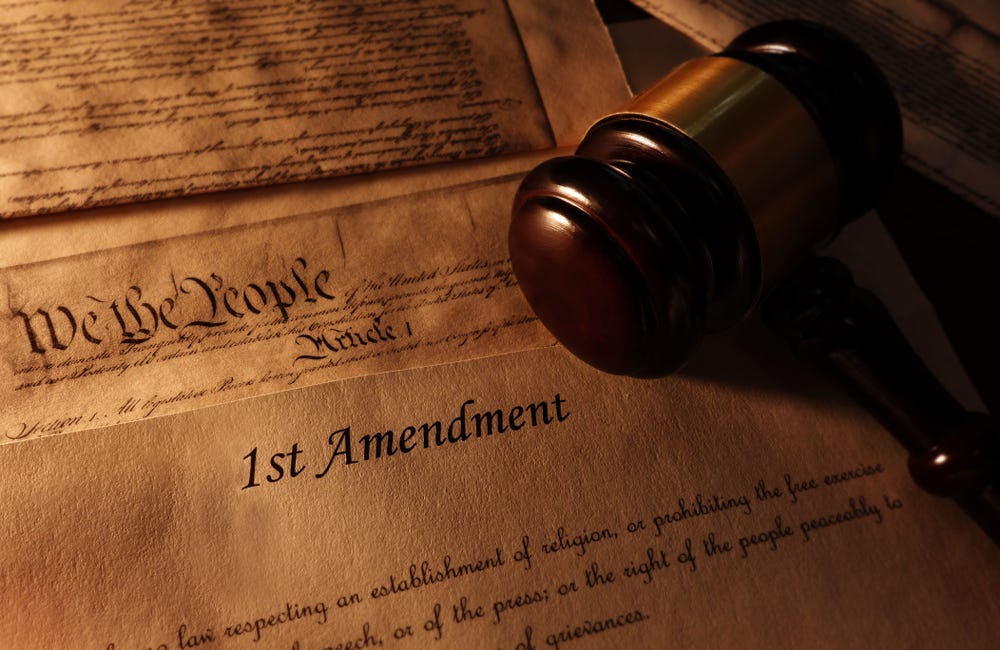E-Pluribus | October 29, 2021
What caused our polarization spiral, scary Gen Z employees, and threats to free speech in Canada and the U.K.
A round up of the latest and best writing and musings on the rise of illiberalism in the public discourse:
Jonathan Haidt and Greg Lukianoff: The Polarization Spiral
At Persuasion, Jonathan Haidt and Greg Lukianoff have published the next part of their lengthy “afterword” to their book The Coddling of the American Mind. In this section, they re-examine the root-causes of the increased polarization we have seen on both the right and the left in recent years. For the left, illiberal impulses that began appearing on college campuses quickly proliferated throughout our cultural institutions. Here, the authors explain the role that social media played in “The Great Awokening.”
After we wrote our Atlantic essay in 2015, it became clear that politics was changing rapidly not only on campus, but off campus as well, and not just in the United States but in many liberal democracies that were being shaken by populist movements, particularly right-wing populism. Jon began to feel as if something had changed in the operating system of society; the old rules just didn’t seem to apply anymore. He began thinking that the change had something to do with the historically unprecedented increase in connectivity that had happened since the Internet became a global phenomenon in the late 1990s, or since social media platforms emerged around 2004. But if those were the culprits, then why didn’t things get weird back then? Why the sudden change around 2014?
It was only when Jon teamed up with the technology writer Tobias Rose-Stockwell that we found what we believe is the thing that warped the fabric of social space-time. It was the introduction of the “like” button, by Facebook, in 2009, which Twitter promptly copied, combined with the introduction of the “retweet” button by Twitter that same year, which Facebook copied in 2011. Before 2009, social media feeds were almost entirely chronological—content was mostly personal (rather than political) and social media was not particularly polarizing. But once users had two super-fast ways to say what they liked, and could do so many times a minute, the social media companies had vastly more information on each user’s behavior, and they began to optimize people’s newsfeeds using algorithms that continuously improved the platform’s ability to engage users and keep them clicking.
At first many thought this viral sharing could be a good thing for democracy, especially after a Facebook page in 2011 helped to start a revolution in Egypt that brought down a corrupt and brutal dictator in just a few weeks. But the rapid increase in public expressions of outrage—not just at murderous dictators but at young adult fiction writers, people who accidentally make the “OK” sign, fellow employees, fellow students who said something, professors who said something—at pretty much anyone at any time for almost any reason—this was the planetary change.
If not for these changes in social media that occurred during President Obama’s first term, we believe that America would not have lost its collective mind during Obama’s second term. Few of the witch hunts and other campus events that we described in The Coddling of the American Mind could have happened—it would have been hard to conduct rapid public shamings of professors and administrators for words or phrases embedded in well-intentioned emails. There would have been no Great Awokening in 2014, and no presidential campaign run on Twitter in 2016.
Read the full piece.
Emma Goldberg: The 37-Year-Olds Are Afraid of the 23-Year-Olds Who Work for Them
Yesterday, we featured a piece from Cathy Young that touched on how “woke” initiatives inside large corporations are part of the driving force behind “cancel culture” and growing illiberal impulses. At the New York Times, Emma Goldberg reports on how this dynamic might be partly due to a generational shift among the corporate workforce, wherein younger “Gen Z” employees are dictating when and how companies should adapt and respond to social justice issues.
In June 2020, as Black Lives Matter protests swelled across the country, the Slack channels of corporate America faced their own form of reckoning. For Ms. Rodriguez, it started with a Saturday morning phone call.
Ms. Rodriguez’s co-founder at Unbound, which sells vibrators, called to say that their social media manager, a younger employee, wanted to know what the company planned to do to support the protests. Ms. Rodriguez didn’t usually receive calls on the weekend; she knew that for her employees this signified a state of emergency. But she also wanted time to plan the team’s response. Within days, her company hired a diversity, equity and inclusion firm to offer employee trainings and started a fund-raiser for a group supporting sex workers of color.
Ms. Rodriguez is one of many managers who recalled her Gen Z employees being the first and most vocal in urging companies to demonstrate their support for the protests after George Floyd’s killing. Tero Isokauppila, 37, president of a food business, heard from junior staff asking if his company would post a black square in solidarity with the movement on Instagram. Elaine Purcell, 34, co-founder of the maternity care start-up Oula, got a Slack message from one of her youngest workers after the shootings at Atlanta-area spas in March asking what the team could do in solidarity with Asian Americans.
To many corporate leaders, this invites a welcome correction after decades when businesses were largely silent on racial inequities both within and outside their offices. But some managers are also struggling to balance the demands of their employees for political engagement with their own sense of what’s appropriate for their brands.
“You talk to older people and they’re like, ‘Dude we sell tomato sauce, we don’t sell politics,’” said Mr. Kennedy, co-founder of Plant People, a certified B corporation. “Then you have younger people being like, ‘These are political tomatoes. This is political tomato sauce.’”
Many are aware, too, that a misstep can lead to backlash, or call-outs from staff: “Some young former employees are much more willing to burn bridges,” Ms. Rodriguez said. “To me it’s shortsighted. Is it worth the social clout of getting gratification on social media but then trashing someone who could continue to help you professionally?”
Mr. Dunn, who left Bonobos and is now founding a social media company, hired a Gen Zer to read a draft of a book he’s writing and notify him of any potentially insensitive or inflammatory language. Within a day, she had left 1,100 comments in the document. Mr. Dunn has also begun trying to monitor his gendered language in the office — instead of “guys,” saying “people,” or better yet “y’all.”
Read it all.
J.D. Tuccille: The U.S. May Stand Alone as a Haven for Free Speech
While recent threats to free speech and open discourse here in the U.S. have mainly stemmed from cultural and societal pressures, the greatest threat for people in the U.K. and Canada comes from their government. As J.D. Tuccille explains at Reason, some of the legislative proposals are even aimed at protecting government officials from criticism - an idea that is anathema to our own understanding of why free speech is necessary in the first place.
It's no secret that government officials don't like the messy business of free speech, especially when it involves criticism leveled at them. Increasingly, they aggregate their grievances, lumping hateful material, vigorous debate, and stuff they just don't like into a catch-all category of "online harms" that they insist must be suppressed by the state. While the First Amendment protects Americans against this latest wave of censorship, authoritarian legislation in Britain and Canada warns of what could be in store if that protection fails and politicians get their way.
The recent assassination of British MP Sir David Amess added impetus to an already strong push for restrictions on speech. Of the resulting uproar from other lawmakers, the BBC noted that "one common thread has emerged – the amount of abuse politicians face online."
"Home Secretary Priti Patel said the government's Online Safety Bill would offer an opportunity for all MPs to come together to close 'the corrosive space online where we see just dreadful behaviour'," added the report.
But the bill was in the works well before the brutal stabbing of Amess, based on a December 2020 white paper complaining that "In the wrong hands the internet can be used to spread terrorist and other illegal or harmful content, undermine civil discourse, and abuse or bully other people." Even earlier, a 2017 U.K. government report fretted that "the intimidation experienced by Parliamentary candidates, and others in public life, has become a threat to the diversity, integrity, and vibrancy of representative democracy in the UK."
Read the full piece.
Around Twitter
Although it may sound like a proposal from the social justice left, Republican Texas lawmakers are targeting books that may “make students feel discomfort”:
More faulty “fire in a crowded theater” First Amendment analysis about Tucker Carlson’s forthcoming documentary on January 6th.
Finally, at least jokes remain legal in Canada . . . for now:








